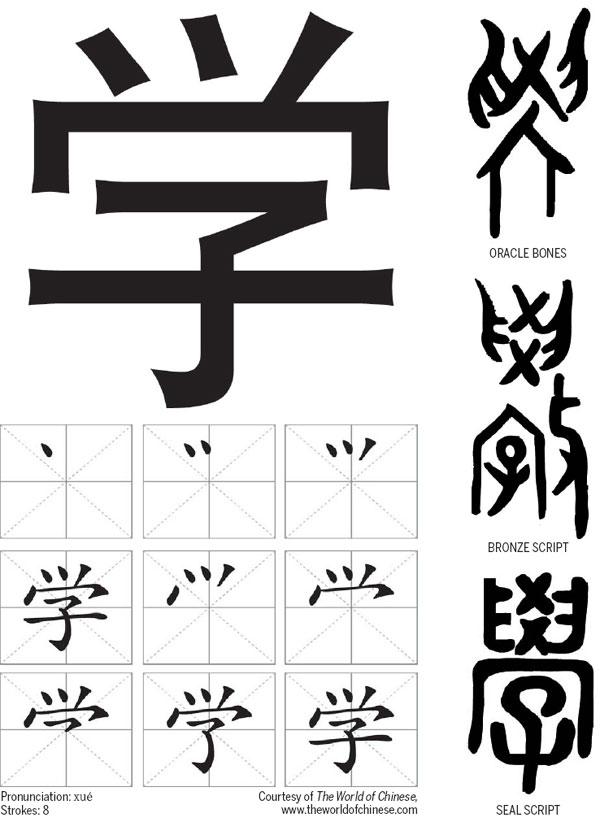The Chinese way of 'learning'
Updated: 2012-10-19 07:50
By Lao Huang and Xiao Chu (黄伟嘉, 储丹丹) (China Daily)
|
||||||||

Revealing the makeup, stroke by stroke, of one of the first characters you'll ever learn
'Y'all gonna learn Chinese," Chinese-American MC Jin promises the bullies in his breakout hit, aptly titled Learn Chinese. It is a tune with no subtle undertones, and even if he were dropping rhymes in modern Chinese rather than English, the written lyrics would carry the same meaning.
Had MC Jin been making threats a few thousand years ago, however, there would have been far more subtleties to work out. The ancient Chinese considered learning and teaching to be two sides of the same coin, and thus 学 (xué, to study) and 教 (jiāo, to teach) were used interchangeably to mean the same thing.
The Discourse of States (《国语》guó yǔ), an ancient collection of records compiled more than 3,000 years ago, makes a fine example of this with the lesson: "顺德以学子,择言以教子" (shùn dé yǐ xué zǐ, zé yán yǐ jiāo zǐ. Teach your son with ethical principles and selected useful words). In this scenario, both 学 and 教 mean "teach".
In modern Chinese, the two characters have taken on distinct meanings, with 学 keeping a grip on the meaning "to learn". Thus, when Confucius said, "学而不思则罔,思而不学则殆"(xué ér bù sī zé wǎng, sī ér bù xué zé dài) over two centuries ago, he stuck to 学 to convey the meaning, "Learning without reasoning leads to confusion, thinking without learning is a waste of effort."
Today, we still use the word 学 in this way, albeit with simpler catchphrases like "活到老, 学到老" (huó dào lǎo, xué dào lǎo), or, "You re never too old to learn."
It says something about Chinese learning methods that 学 has another particular meaning when written alone: it can also be interpreted as "to mimic". For instance,
"她学鸟叫, 学得很像" (tā xué niǎo jiào, xué de hěn xiàng. She can mimic birds really closely), or "她的语调太奇怪了, 我学不来" (tā de yǔ diào tài qí guài le, wǒ xué bù lái. Her tone is too strange for me to mimic).
In order to avoid confusion, "to learn" is often differentiated from other meanings by writing it as 学习 (xué xí) instead of just 学, a practice that also fits with modern Chinese's tendency to favor two-character words for reasons of rhythm.
In other words and expressions, 学 can form part of a noun, usually one that relates to learning activities, as in 学问 (xué wèn, knowledge), 学科 (xué kē, discipline),
学术 (xué shù, academics), 学说 (xué shuō, doctrine) and 学派 (xué pài, school as in school of thought).
Because of the multiple meanings of 学, it is essential to consider the character's specific meaning in a word or expression. In "勤学好问" (qín xué hào wèn, to study diligently and ask frequent questions), it refers to 学习, but in a phrase used to show modesty, "才疏学浅" (cái shū xué qiǎn, to have little talent and limited knowledge), it means 学问.
Translated by Liu Jue (刘珏)
The World of Chinese
(China Daily 10/19/2012 page19)

 Relief reaches isolated village
Relief reaches isolated village
 Rainfall poses new threats to quake-hit region
Rainfall poses new threats to quake-hit region
 Funerals begin for Boston bombing victims
Funerals begin for Boston bombing victims
 Quake takeaway from China's Air Force
Quake takeaway from China's Air Force
 Obama celebrates young inventors at science fair
Obama celebrates young inventors at science fair
 Earth Day marked around the world
Earth Day marked around the world
 Volunteer team helping students find sense of normalcy
Volunteer team helping students find sense of normalcy
 Ethnic groups quick to join rescue efforts
Ethnic groups quick to join rescue efforts
Most Viewed
Editor's Picks

|

|

|

|

|

|
Today's Top News
Chinese fleet drives out Japan's boats from Diaoyu
Health new priority for quake zone
Inspired by Guan, more Chinese pick up golf
Russia criticizes US reports on human rights
China, ROK criticize visits to shrine
Sino-US shared interests emphasized
China 'aims to share its dream with world'
Chinese president appoints 5 new ambassadors
US Weekly

|

|







